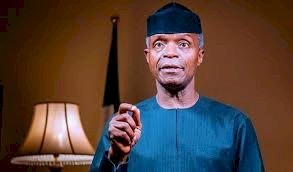Protests alone won’t bring change — Osinbajo
Osinbajo noted the empowering nature of social media but called for self-regulation to ensure its positive impact in society.

Former Vice President Yemi Osinbajo has urged that political action for social change in developing countries should extend beyond protests to achieve tangible results.
Osinbajo made the statement on Thursday, November 28, during the Technology, New Media, Citizens, and Governance Conference in Gbagada, Lagos.
Osinbajo highlighted the role of young Africans in leveraging social media for protests in Nigeria, Kenya, and Zambia, while emphasizing the need for strategic follow-up to protests.
Osinbajo noted the empowering nature of social media but called for self-regulation to ensure its positive impact in society.
“Social media is really empowering for all and it is non-discriminatory — the weak, the strong, the treacherous, the mischievous, and haters of every kind — have cover to speak their minds, speak truth to power, and insult,” he said.
“I think it is a critical medium, but we must find ways of self-regulation. In developing countries with fragile economies and widespread poverty, we don’t have the luxury of political action for its own sake.”
Osinbajo underscored the importance of aligning political actions with measurable outcomes, especially in societies where livelihoods are tied to daily earnings.
“There is a sense of power and excitement that comes with protest. Political action must go beyond protests and the euphoria that it brings. It must lead to some measurable and tangible results, otherwise it becomes counter-productive.
“In poor societies, every day of protest is valuable. It means that millions of informal workers and traders make a huge sacrifice because they earn on a daily basis. Political action must lead somewhere. It must move a step closer to resolving the issue that cripples our society.”
Osinbajo further argued that meaningful and structural societal change requires participation in partisan politics. He warned against the prevailing reluctance among elites and civil society to engage in politics, stressing that reforms on a large scale are only achievable through political power.
“In a democratic society where the objective of political action is to make substantial and structural change, this may only be possible within the context of partisan politics,” he said.
“Yes, we can be effective as pressure groups, and some level of change is possible by advocacy action. But the truth is that for the depth of change that is required in developing countries, political power is required.
“The puritan stance of the elite, which of course includes those in the civil societies, is that we should not get our hands dirty in politics. This will not achieve change at a scale in any important area of concern.”
Citing his personal experience, Osinbajo said he was able to implement far-reaching reforms in Lagos’s justice system after his appointment as attorney-general in 1999, a feat he struggled to achieve as a university lecturer.
“If we take the position of don’t get your hands dirty or don’t get into politics, we can’t achieve change at the scale that is required, especially in our society,” he concluded.






















